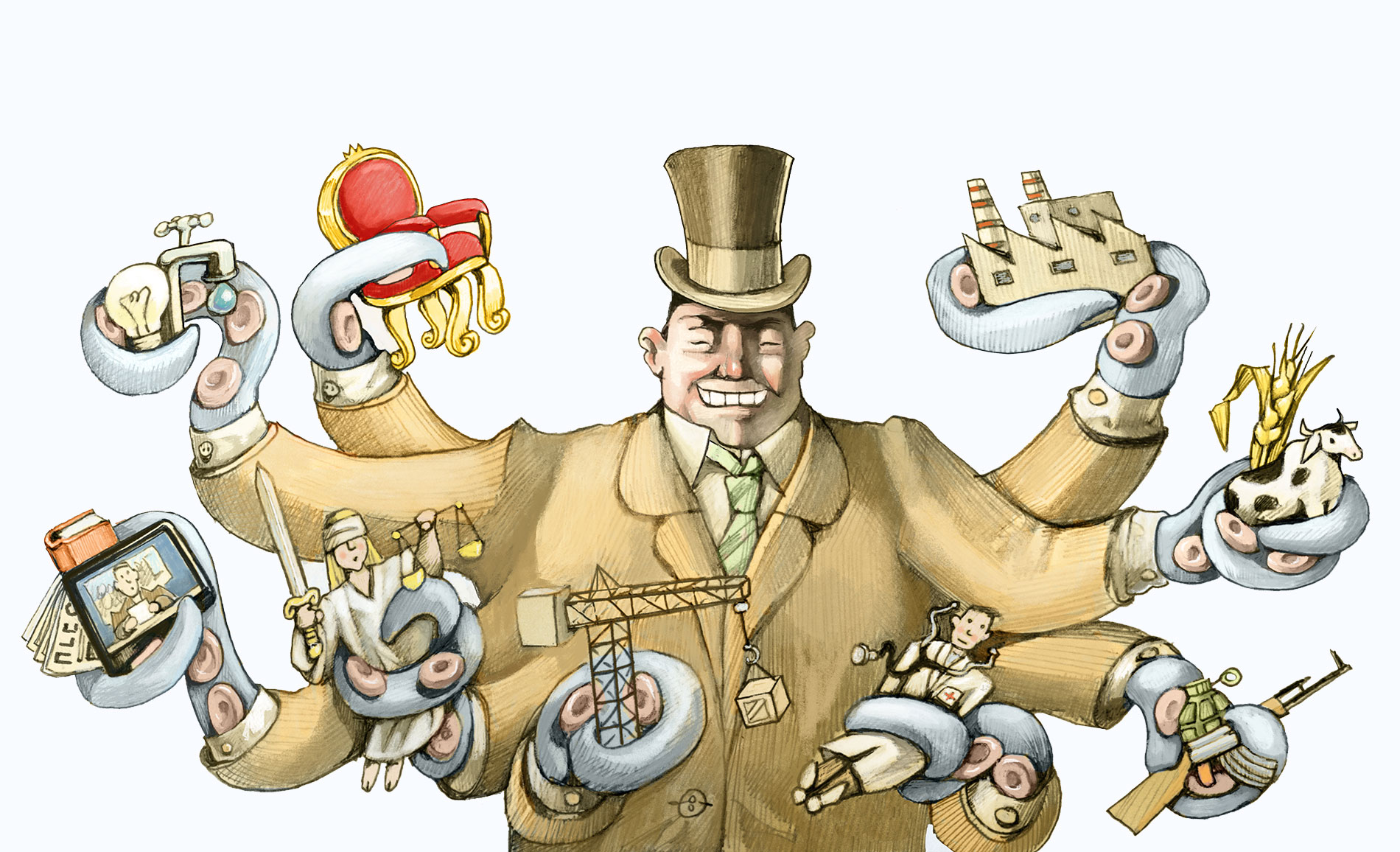With the continuous attempt of societies to find the best economic systems in order to follow them and achieve economic efficiency, the capitalist economic system appeared as an attempt to provide solutions to the economic problems caused by the socialist system. What are the characteristics of this system, as well as its positive and negative aspects?
What is the capitalist economic system?
The capitalist economic system, also known as capitalism, is an economic system in which the private sector — individuals or businesses — owns capital goods and the majority of the means of production in the state, so that the production of goods and services is determined by supply and demand in the public market — the market economy — rather than through central market planning.Production and income distribution are largely directed by the operation of these markets, and in a pure capitalist economy, markets are free without government interference; that is, individuals are not restricted and can decide where to invest and what to produce or sell and set exchange prices for goods and services, so Under the capitalist system, the market operates without controls, restrictions, or oversight.
Today, most countries practice a mixed capitalist system that includes a certain degree of government regulation of business and the ownership of certain selected industries, with due regard for the economic freedom of individuals and the legalization of these restrictions to a large extent.
How does capitalism work?
Under capitalism, the private sector on the supply side competes against each other for the highest possible profit, i.e., sells their goods at the highest possible price while keeping their costs as low as possible. This competition maintains price moderation and production efficiency, although it can also lead to worker exploitation and poor working conditions, especially in countries that do not have strict labor laws.
Capitalism operates freely on capital markets as well, so the laws of supply and demand determine the prices of stocks, bonds, derivatives, currencies, and commodities. On equal opportunities, the role of the government in this system lies in the following:
- protect the free market; in order to prevent unfair advantages obtained by monopolistic parties.
- Preventing manipulation of information and ensuring its fair and equitable distribution.
- Protecting the market by maintaining order with national defense.
- Maintaining the infrastructure in the country.
So the government imposes taxes on capital and income gains to achieve these goals.

What are the characteristics of a capitalist economic system?
In the capitalist economic system, individuals own and manage the means of production with the main objective of maximizing profits. Free projects, competition, and private ownership of property are the important features of the capitalist economic system. The following are some of the important characteristics of the capitalist economic system:
Free Enterprise Economy
The capitalist economy is called the “free enterprise economy,” whereby individuals and private companies have the right to own and use property and have the right to earn income, save, and spend, and they are allowed to obtain resources, organize production, and sell products in any way they want and to any party, and for this there will be no government restrictions or any other restrictions. on the freedom of individuals and their ability to do any business, and the freedom of individuals and institutions to choose any type of work, professions, or projects.
Private Ownership
Under a capitalist economy, factors of production such as labor, land, capital, and organization are owned by private property, and the law in the state protects, controls, and enforces private property. Individuals have the right to own property and the freedom to use property as they wish, meaning there is a private sector that owns property, factories, and equipment, and producers decide how to use them. It tells how they run their business, how much they can produce, and how many people they will work with.
The Ability to Choose an Occupation
Under the capitalist economy, the individual enjoys the freedom to choose any profession to work in, and the freedom of choice enables individuals to enter the field in which they have knowledge and desire and buy the desired property to achieve maximum profit. Because of this type of freedom, businessmen can reap the profits of their businesses, and for this reason, resources will flow more to areas where the yield is greater.

Market Mechanism
It is the most important distinguishing feature of the capitalist economy and is also called the pricing mechanism. In the capitalist economy, the profit associated with the market mechanism is directed toward the process of resource allocation, so under this system, the economic system moves to become free pricing, and the pricing mechanism determines the level of consumption, production, and distribution and acts as an organizing mechanism in the capitalist society.
Consumers’ Sovereignty
Under the capitalist economy, consumers enjoy complete freedom to choose what they buy and what they want to consume, and therefore the consumer is the “king of the market” under capitalism. For this reason, producers take into account consumers’ demands, tastes, and preferences while producing goods.
Freedom to save and spend
Under capitalism, the consumer enjoys the freedom to dispose of his personal income in any way he wants, which means that he may spend more than he earns, save his entire income, or give a loan to anyone.
Competition among sellers
It is a feature of the free-market capitalist system, and competition between producers makes them benefit in the best possible way from the factors of production and enables them to produce goods at the lowest cost. to make itself more attractive when compared to its competitors by lowering its prices.
Competition may also lead companies to strive to be better than their competitors so that they can obtain a greater share of the market for their products or services, which leads to an increase in their profits.
Freedom to enter into contracts
Under the capitalist economy, people enjoy the freedom to conclude contracts as they wish, meaning that each person has the freedom to sell his goods or provide services to whomever he wishes.
Inheritance
As a result of this system, the right to grant or possess property in the will is granted.

No Central Plan
In a capitalist economy, there is no central plan to direct and control various business activities since it is market forces, not government, that influence resource allocation and investment decisions.
Minimal Government Intervention
Societies that follow the capitalist system believe that markets should operate on their own without government interference, which is known as “laissez-faire,” and under capitalism, it is believed that a free market will always create the right amount of supply to meet demand and that prices will adjust accordingly. The market is also believed to be free of any government intervention, that is, there are no regulations or labor laws that impede the efficiency of the economy in a free market, yet capitalist societies completely devoid of government exist only in theory.
Profit Motive
Although some goods or services may satisfy some of the needs of the people, they will not be available unless people have the resources to pay for them, and the profit motive may lead to the accumulation of wealth, which is a key factor in providing and encouraging them to work under the capitalist economic system.
What are the advantages of the capitalist economic system?
The capitalist economic system, which depends on freedom in the markets and on private property, has positive aspects and economic advantages. The following are the positive aspects achieved due to following the capitalist system:
Efficiency
Firms operating in a capitalist system have effective incentives that produce the goods they want. These incentives also create pressure to use resources efficiently without wasting them to reduce costs.
Innovation
Capitalism has a high dynamic in which entrepreneurs and companies seek to create and develop profitable products, so there will be no stagnation, but businessmen will always be investing in new products for which consumer demand is high, which will contribute to the development of products and provide more choices for consumers.
Economic growth
In the capitalist system, companies and individuals face incentives to be innovative and hard workers, which will contribute to creating a climate of innovation and economic expansion and an increase in real GDP that will improve living standards.
What are the disadvantages of the capitalist economic system?
Although the capitalist economic system has many positive aspects, the negatives and shortcomings that it causes cannot be ignored. The following is an explanation of the negatives of the capitalist system:
Monopoly power
Private ownership of capital enables firms to gain monopolistic power in product and labor markets, so that firms with monopolistic power can exploit their position to command higher prices.
Monopsony power
In capitalist societies, firms with monopoly power can pay workers lower wages, and there is often a large disparity between the owners of capital and those who work in the firms.
Social benefit ignored
Capitalist firms in free markets that maximize profit ignore negative externalities, such as pollution from production, and in turn, the free market will not provide goods with positive externalities, such as health, public transportation, and education, which will lead to an inefficient allocation of resources.
Inherited wealth and wealth inequality
The capitalist society is based on the legal right to private property and the ability to pass on wealth to future generations, which created an argument among the opinionated capitalists by saying that their wealth and efforts should be inherited from earning and working, and there is a problem that often people are rich simply because they inherit wealth or are born into a privileged class. Therefore, the capitalist system will fail to achieve equality of results and provide equal opportunities.
Diminishing marginal utility of wealth
The system of capitalism ignores the diminishing marginal utility of wealth, so that a millionaire who receives an extra million does not see a small increase in economic welfare, but a million spent on health care would provide a much larger increase and a noticeable increase in social care.
Read also: The most important financial crises



